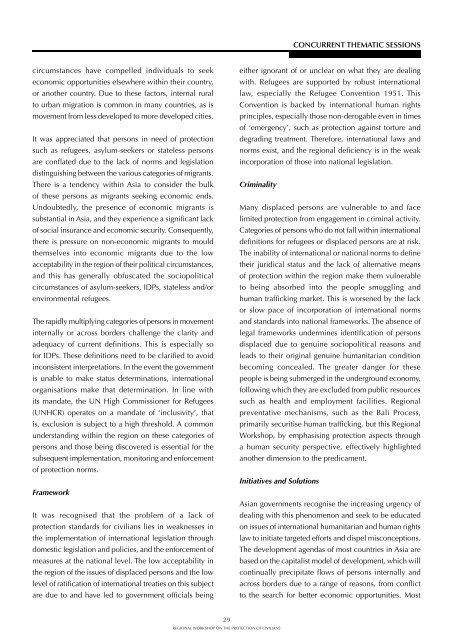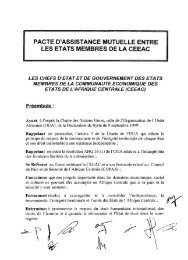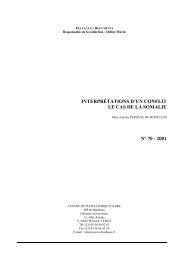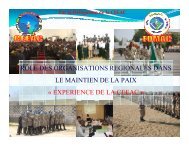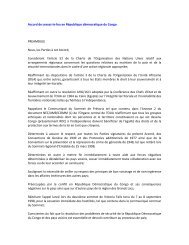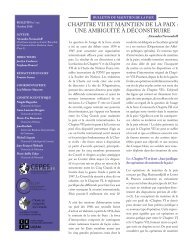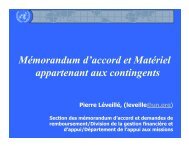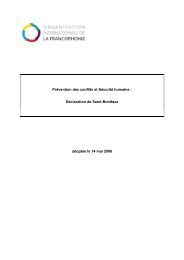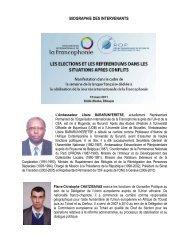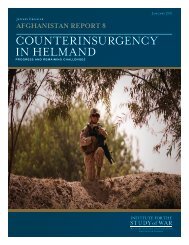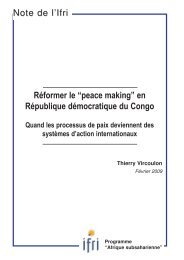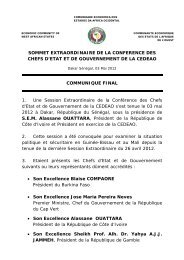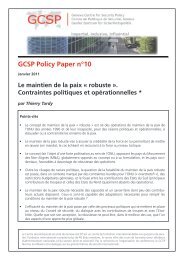Regional Workshop on the Protection of Civilians - S. Rajaratnam ...
Regional Workshop on the Protection of Civilians - S. Rajaratnam ...
Regional Workshop on the Protection of Civilians - S. Rajaratnam ...
Create successful ePaper yourself
Turn your PDF publications into a flip-book with our unique Google optimized e-Paper software.
CONCURRENT THEMATIC SESSIONS<br />
circumstances have compelled individuals to seek<br />
ec<strong>on</strong>omic opportunities elsewhere within <strong>the</strong>ir country,<br />
or ano<strong>the</strong>r country. Due to <strong>the</strong>se factors, internal rural<br />
to urban migrati<strong>on</strong> is comm<strong>on</strong> in many countries, as is<br />
movement from less developed to more developed cities.<br />
It was appreciated that pers<strong>on</strong>s in need <strong>of</strong> protecti<strong>on</strong><br />
such as refugees, asylum-seekers or stateless pers<strong>on</strong>s<br />
are c<strong>on</strong>flated due to <strong>the</strong> lack <strong>of</strong> norms and legislati<strong>on</strong><br />
distinguishing between <strong>the</strong> various categories <strong>of</strong> migrants.<br />
There is a tendency within Asia to c<strong>on</strong>sider <strong>the</strong> bulk<br />
<strong>of</strong> <strong>the</strong>se pers<strong>on</strong>s as migrants seeking ec<strong>on</strong>omic ends.<br />
Undoubtedly, <strong>the</strong> presence <strong>of</strong> ec<strong>on</strong>omic migrants is<br />
substantial in Asia, and <strong>the</strong>y experience a significant lack<br />
<strong>of</strong> social insurance and ec<strong>on</strong>omic security. C<strong>on</strong>sequently,<br />
<strong>the</strong>re is pressure <strong>on</strong> n<strong>on</strong>-ec<strong>on</strong>omic migrants to mould<br />
<strong>the</strong>mselves into ec<strong>on</strong>omic migrants due to <strong>the</strong> low<br />
acceptability in <strong>the</strong> regi<strong>on</strong> <strong>of</strong> <strong>the</strong>ir political circumstances,<br />
and this has generally obfuscated <strong>the</strong> sociopolitical<br />
circumstances <strong>of</strong> asylum-seekers, IDPs, stateless and/or<br />
envir<strong>on</strong>mental refugees.<br />
The rapidly multiplying categories <strong>of</strong> pers<strong>on</strong>s in movement<br />
internally or across borders challenge <strong>the</strong> clarity and<br />
adequacy <strong>of</strong> current definiti<strong>on</strong>s. This is especially so<br />
for IDPs. These definiti<strong>on</strong>s need to be clarified to avoid<br />
inc<strong>on</strong>sistent interpretati<strong>on</strong>s. In <strong>the</strong> event <strong>the</strong> government<br />
is unable to make status determinati<strong>on</strong>s, internati<strong>on</strong>al<br />
organisati<strong>on</strong>s make that determinati<strong>on</strong>. In line with<br />
its mandate, <strong>the</strong> UN High Commissi<strong>on</strong>er for Refugees<br />
(UNHCR) operates <strong>on</strong> a mandate <strong>of</strong> ‘inclusivity’, that<br />
is, exclusi<strong>on</strong> is subject to a high threshold. A comm<strong>on</strong><br />
understanding within <strong>the</strong> regi<strong>on</strong> <strong>on</strong> <strong>the</strong>se categories <strong>of</strong><br />
pers<strong>on</strong>s and those being discovered is essential for <strong>the</strong><br />
subsequent implementati<strong>on</strong>, m<strong>on</strong>itoring and enforcement<br />
<strong>of</strong> protecti<strong>on</strong> norms.<br />
Framework<br />
It was recognised that <strong>the</strong> problem <strong>of</strong> a lack <strong>of</strong><br />
protecti<strong>on</strong> standards for civilians lies in weaknesses in<br />
<strong>the</strong> implementati<strong>on</strong> <strong>of</strong> internati<strong>on</strong>al legislati<strong>on</strong> through<br />
domestic legislati<strong>on</strong> and policies, and <strong>the</strong> enforcement <strong>of</strong><br />
measures at <strong>the</strong> nati<strong>on</strong>al level. The low acceptability in<br />
<strong>the</strong> regi<strong>on</strong> <strong>of</strong> <strong>the</strong> issues <strong>of</strong> displaced pers<strong>on</strong>s and <strong>the</strong> low<br />
level <strong>of</strong> ratificati<strong>on</strong> <strong>of</strong> internati<strong>on</strong>al treaties <strong>on</strong> this subject<br />
are due to and have led to government <strong>of</strong>ficials being<br />
ei<strong>the</strong>r ignorant <strong>of</strong> or unclear <strong>on</strong> what <strong>the</strong>y are dealing<br />
with. Refugees are supported by robust internati<strong>on</strong>al<br />
law, especially <strong>the</strong> Refugee C<strong>on</strong>venti<strong>on</strong> 1951. This<br />
C<strong>on</strong>venti<strong>on</strong> is backed by internati<strong>on</strong>al human rights<br />
principles, especially those n<strong>on</strong>-derogable even in times<br />
<strong>of</strong> ‘emergency’, such as protecti<strong>on</strong> against torture and<br />
degrading treatment. Therefore, internati<strong>on</strong>al laws and<br />
norms exist, and <strong>the</strong> regi<strong>on</strong>al deficiency is in <strong>the</strong> weak<br />
incorporati<strong>on</strong> <strong>of</strong> those into nati<strong>on</strong>al legislati<strong>on</strong>.<br />
Criminality<br />
Many displaced pers<strong>on</strong>s are vulnerable to and face<br />
limited protecti<strong>on</strong> from engagement in criminal activity.<br />
Categories <strong>of</strong> pers<strong>on</strong>s who do not fall within internati<strong>on</strong>al<br />
definiti<strong>on</strong>s for refugees or displaced pers<strong>on</strong>s are at risk.<br />
The inability <strong>of</strong> internati<strong>on</strong>al or nati<strong>on</strong>al norms to define<br />
<strong>the</strong>ir juridical status and <strong>the</strong> lack <strong>of</strong> alternative means<br />
<strong>of</strong> protecti<strong>on</strong> within <strong>the</strong> regi<strong>on</strong> make <strong>the</strong>m vulnerable<br />
to being absorbed into <strong>the</strong> people smuggling and<br />
human trafficking market. This is worsened by <strong>the</strong> lack<br />
or slow pace <strong>of</strong> incorporati<strong>on</strong> <strong>of</strong> internati<strong>on</strong>al norms<br />
and standards into nati<strong>on</strong>al frameworks. The absence <strong>of</strong><br />
legal frameworks undermines identificati<strong>on</strong> <strong>of</strong> pers<strong>on</strong>s<br />
displaced due to genuine sociopolitical reas<strong>on</strong>s and<br />
leads to <strong>the</strong>ir original genuine humanitarian c<strong>on</strong>diti<strong>on</strong><br />
becoming c<strong>on</strong>cealed. The greater danger for <strong>the</strong>se<br />
people is being submerged in <strong>the</strong> underground ec<strong>on</strong>omy,<br />
following which <strong>the</strong>y are excluded from public resources<br />
such as health and employment facilities. <str<strong>on</strong>g>Regi<strong>on</strong>al</str<strong>on</strong>g><br />
preventative mechanisms, such as <strong>the</strong> Bali Process,<br />
primarily securitise human trafficking, but this <str<strong>on</strong>g>Regi<strong>on</strong>al</str<strong>on</strong>g><br />
<str<strong>on</strong>g>Workshop</str<strong>on</strong>g>, by emphasising protecti<strong>on</strong> aspects through<br />
a human security perspective, effectively highlighted<br />
ano<strong>the</strong>r dimensi<strong>on</strong> to <strong>the</strong> predicament.<br />
Initiatives and Soluti<strong>on</strong>s<br />
Asian governments recognise <strong>the</strong> increasing urgency <strong>of</strong><br />
dealing with this phenomen<strong>on</strong> and seek to be educated<br />
<strong>on</strong> issues <strong>of</strong> internati<strong>on</strong>al humanitarian and human rights<br />
law to initiate targeted efforts and dispel misc<strong>on</strong>cepti<strong>on</strong>s.<br />
The development agendas <strong>of</strong> most countries in Asia are<br />
based <strong>on</strong> <strong>the</strong> capitalist model <strong>of</strong> development, which will<br />
c<strong>on</strong>tinually precipitate flows <strong>of</strong> pers<strong>on</strong>s internally and<br />
across borders due to a range <strong>of</strong> reas<strong>on</strong>s, from c<strong>on</strong>flict<br />
to <strong>the</strong> search for better ec<strong>on</strong>omic opportunities. Most<br />
29<br />
REGIONAL WORKSHOP ON THE PROTECTION OF CIVILIANS


